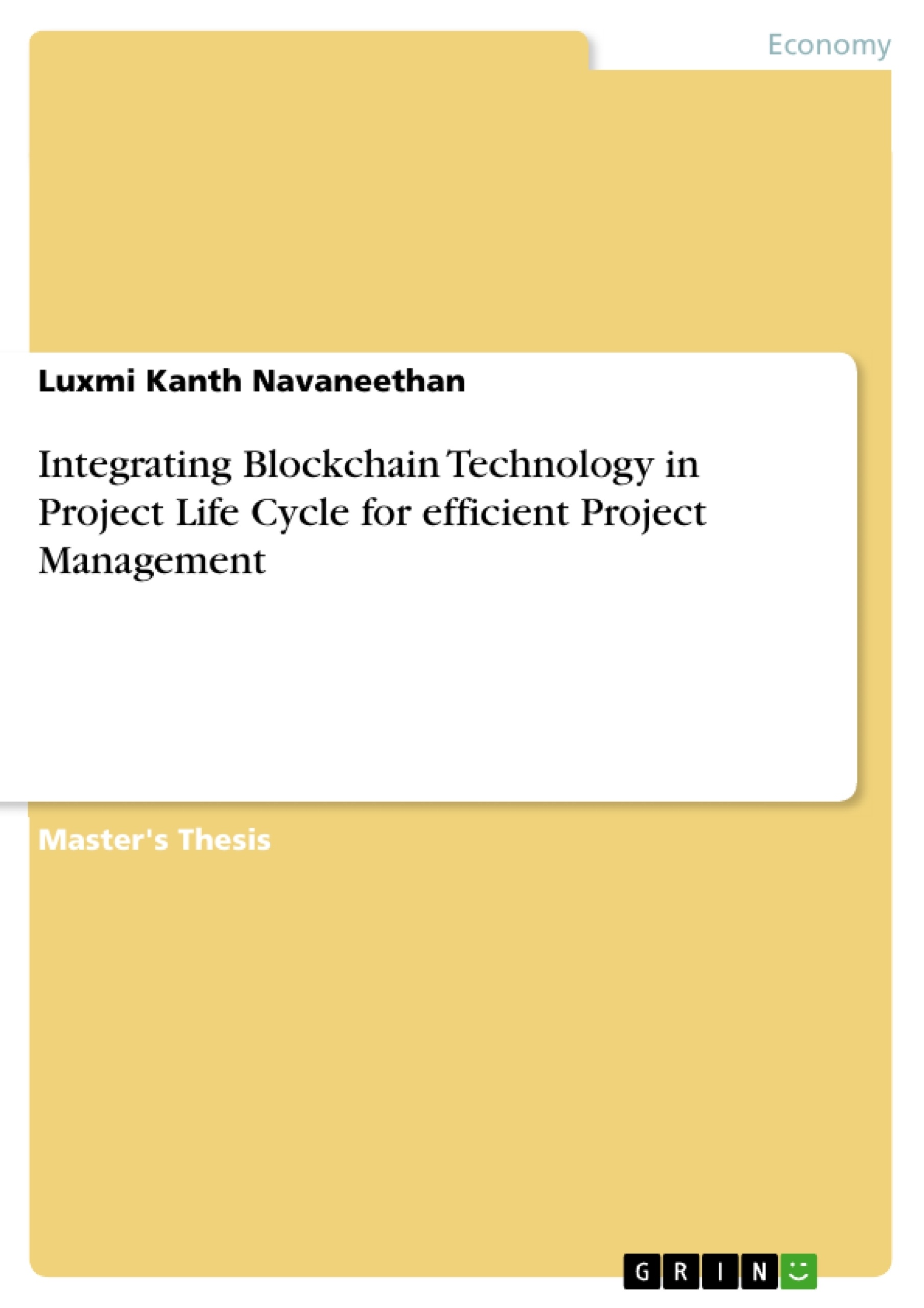Blockchain Technology has the capability to develop as a disruptive technology in management and business domains. There is a lack of understanding also less amount of information about innovative blockchain technology and its potential future influences that hinder its academic and realistic application. Organizations it is essential to know the right influence and risk of blockchain technology adaptions also applications in order to obtain also retain economic advantages. There is no doubt such kind of revolutionary technology will have a direct effect on the conventional way of managing projects. Unless the organizations identify the shift, they will be left in the background wondering what had happened.
This research study recognizes peer-reviewed journal papers also presents a systematic literature review study of the furthermost suitable blockchain technology features to be integrated into the project life cycle for efficient project management. Preliminary research shows that Blockchain technology is an immutable, distributed ledger technology that has been implemented as an enabling system to provision cryptocurrencies. Blockchain Technology is presently resolving various issues in different domains. Such as supply chain, medical health, energy, construction, finance and manufacturing but not in project management, due to its early stages. In addition, that most of the organizations use Ethereum blockchain and smart contracts towards addressing their difficulties and enhancing efficiency in their respective fields of business and management process.
Research findings shows that smart contract and distributed ledger technology are the most adapted blockchain features in current business organizations, furthermore study recommends the kind of changes need to adapted by the organizations in order to handle future projects. Finally systematic literature review research findings sheds light on future directions of research studies could contain analysis of the different approaches which Ethereum and additional decentralized blockchain technologies can be used to build efficient project management framework.
Inhaltsverzeichnis (Table of Contents)
- INTRODUCTION
- LITERATURE REVIEW
- Introduction
- Blockchain for Business and Management
- Distributed Ledger Technology
- Construction Sector
- Supply Chain Sector
- Healthcare Sector
- Clinical Research Sector
- Energy Sector
- Internet of Things (IoT)
- Financial Sector
- Voting System
- Potential Benefits of Blockchain Technology
- RESEARCH METHODOLOGY
- Planning
- Searching
- Screening
- Selection Results
- Publications Over time
- Data Extraction
- Assurance of Quality
- Limitations
- DATA ANALYSIS
- Significant Word Count
- Discussions
- CONCLUTION & RECOMMEDATIONS
- Research Question 1
- Blockchain Integration - Medical & Healthcare
- Blockchain Integration - Construction Projects
- Blockchain Integration – Manufacturing & Supply Chain
- Research Question 2
- Research Question 3
- Smart Contract in Project Management
- Distributed Ledger Technology (DLT) for Project Management
- Future of Project Management
- REFERENCES
Zielsetzung und Themenschwerpunkte (Objectives and Key Themes)
This dissertation explores the potential of blockchain technology to enhance project management efficiency. It examines the key features of blockchain and analyzes its suitability for integration into the project life cycle.
- Blockchain technology's impact on project management efficiency.
- Suitable features of blockchain for project management integration.
- Benefits of blockchain adoption in various sectors.
- Challenges and limitations of integrating blockchain into project management.
- Future directions for research on blockchain and project management.
Zusammenfassung der Kapitel (Chapter Summaries)
- Introduction: This chapter provides an overview of project management stages and the potential of blockchain technology to enhance project efficiency.
- Literature Review: This chapter explores existing research on blockchain technology, discussing its applications in different sectors like healthcare, construction, and finance. It also highlights the potential benefits of blockchain in enhancing business and management processes.
- Research Methodology: This chapter details the research process, including the planning, searching, screening, and data extraction methods employed. It also discusses the limitations of the study.
- Data Analysis: This chapter presents the results of the analysis, focusing on significant word count and key discussions related to the research questions.
Schlüsselwörter (Keywords)
The main keywords and focus topics of this dissertation include blockchain technology, distributed ledger technology, smart contracts, project management, project life cycle, efficiency, healthcare, construction, supply chain, and future directions.
Frequently Asked Questions
How can Blockchain technology improve project management?
Blockchain can enhance efficiency by providing an immutable, distributed ledger for tracking project progress, managing contracts via smart contracts, and ensuring transparency.
What are the most adapted blockchain features in business today?
Research findings show that smart contracts and distributed ledger technology (DLT) are the most widely adapted features in current organizations.
In which sectors is Blockchain currently being implemented?
Blockchain is being used in supply chain, healthcare, construction, energy, finance, and manufacturing sectors to address various operational difficulties.
What is the role of Smart Contracts in project life cycles?
Smart contracts automate agreements and transactions, reducing the need for intermediaries and increasing the speed and reliability of project management processes.
What hinders the application of Blockchain in management?
A lack of understanding and limited information about the technology's potential future influences often hinder its academic and realistic application in organizations.
- Citar trabajo
- Luxmi Kanth Navaneethan (Autor), 2019, Integrating Blockchain Technology in Project Life Cycle for efficient Project Management, Múnich, GRIN Verlag, https://www.grin.com/document/539105



